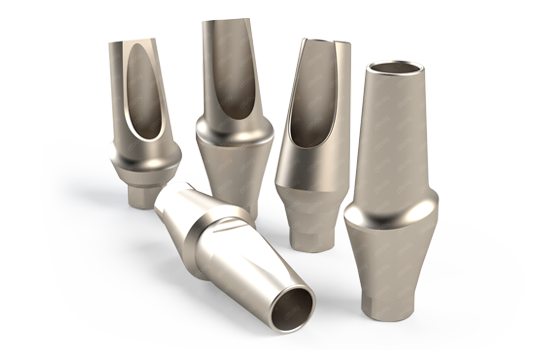Titanium Abutment | EM™ - Dental Implant components


Titanium Abutments
Lightweight, high strength-to-weight ratio, and high biocompatibility, in a single unit.
Edison Medical titanium abutments are a versatile, high-strength, high-biocompatibility option for dental restoration systems. Titanium is the most commonly used material for the production of implant abutments, and EM uses titanium nitride-coated Grade 5 Ti-6AL-4V-ELI to provide an abutment with superior strength.
Each abutment is subjected to a series of fatigue and compression tests to guarantee strength and quality. The EM titanium abutment portfolio is available in a range of widths, collar heights, shapes, and angulations. Edison Medical’s diverse portfolio of titanium abutments for both standard and CAD/CAM systems provides a solution for every implant scenario, and all abutments are designed for use with more than 70 of the market’s leading implant systems.
Benefits of Ti-6AL-4V-ELI and TiN coating
The Ti-6AL-4V-ELI alloy takes titanium’s light-weight, biocompatible and corrosion-resistant qualities and reinforces them with a more durable and ductile material. The titanium nitride (TiN) coating offers added strength to the abutment surface by increasing its resistance to abrasion and wear, improving its interaction with the biological system within the oral environment, and maintaining a proper friction coefficient within the implant complex.
Titanium temporary abutments
In addition to standard titanium abutments, Edison Medical also offers a range of titanium temporary abutments featuring a grooved cuff that promotes improved bonding. These temporary abutments can also be cut at the groove to customize abutment height.
The post-osteotomy healing phase is one of the most crucial of the entire restoration process. The correct choice of abutment material is critical to ensure proper healing of surrounding bone and tissue. Titanium’s mechanical, physical and biocompatible properties make it an ideal material for use in temporary abutments, whose close proximity to healing peri-implant tissues influences overall healing potential.
Titanium’s light weight makes it particularly ideal in direct-loading scenarios. Temporary abutments made of titanium are also advantageous in terms of temporization as well as shaping/regeneration of interdental papillae, both which can contribute to improved quality of the final restoration’s emergence profile and overall esthetic.
Titanium: The workhorse of materials in dental implantology
The physical, chemical and biological properties of titanium that have established it as a veteran material in the dental implant industry were the same properties that catalyzed its use by the aerospace industry in the 1950’s.
The titanium metal industry, in fact, was established predominantly as a response to demand from a then booming aerospace industry. Compared to other candidates for use in aerospace construction, titanium always comes out on top. Compared to steel, titanium is 30% stronger and 50% lighter. When compared to aluminum, titanium is 60% heavier but twice as strong and has a much higher resistance to heat and corrosion.
In today’s implant industry titanium is coveted for the same properties that it was sought out for by the aerospace industry: high strength-to-weight ratio, light weight, and high resistance to corrosion and varying temperature.
One of the major advantages of titanium for the medical world is its high biocompatibility. As titanium began its widely-established use in aerospace parts in the 1950’s, the first titanium dental implant was placed in Sweden by orthopedic surgeon Brånemark.
This first observation of osseointegration using titanium in a patient’s mouth established the metal as an ideal dental restoration material, and is still considered to be so to this day.
Titanium as a driver of osseointegration
Successful implant therapy is defined as a restoration around which the bone and soft tissue are fully and properly healed. While many factors influence this success, osseointegration is one of the most significant, and titanium’s high biocompatibility helps drive the success of osseointegration in the initial stages of restoration.
Titanium’s biocompatibility also allows for long-term, continuous beneficial effects of the restoration on surrounding bone and tissue. This includes the formation and preservation of the peri-implant soft tissue barrier which aids in sealing off the implant site against microleakage.
What is a titanium abutment?
A titanium abutment is a dental implant abutment made from pure titanium or titanium alloy. Titanium is one of the most cherished metals in the dental implantology industry, demonstrating highly desirable mechanical, physical and biocompatible properties for use in the oral environment. Being lightweight with a high strength-to-weight ratio and resistance to corrosion makes it incredibly versatile in use for both temporary and long-term implant restoration components.






